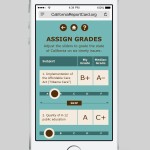 In the past month or so, we’ve seen elections on both sides of the Atlantic attract pretty meagre levels of voter participation. With turnout in the EU elections sitting at around 34% in the UK, and 43% for the whole of Europe, it’s hard to dispute that we have an engaged electorate. What’s more, without an engaged electorate, is it really possible to say that democracy is working?
In the past month or so, we’ve seen elections on both sides of the Atlantic attract pretty meagre levels of voter participation. With turnout in the EU elections sitting at around 34% in the UK, and 43% for the whole of Europe, it’s hard to dispute that we have an engaged electorate. What’s more, without an engaged electorate, is it really possible to say that democracy is working?
Suffice to say, society has changed considerably since many of the mechanisms by which policy makers learn what the electorate think and want were first invented. It seems rather outdated that politics still relies on elections, opinion polls, focus groups and the like to gauge the public discourse. That’s not to say that these methods aren’t useful, but they are inherently expensive and complicated to run, hence they only tend to occur infrequently.
The folks behind the California Report Card believe a better way is available. They have developed their platform with the intention of streamlining and organizing public input and hopefully make policy making a more inclusive process.
The process is a fairly straightforward one. Participants on the site can assign a simple letter grade alongside key issues, whilst also being able to suggest new ideas for consideration by officials. The aim is that policy makers will then utilize this information in their decision making process.
A prototype of the report card was tested earlier this year, with residents from across California providing over 20,000 grades across a variety of issues. The general feeling across the user base was that it allowed them a greater say on issues that mattered to them.
It also revealed some surprising concerns amongst the electorate, with disaster preparedness a bigger issue than was previously thought. This initial feedback not only improved public policy insights, it also led to new versions of the report card itself, with a greater focus on issues such as wildfires and earthquakes.
The report card is part of an ongoing collaboration between the CITRIS Data and Democracy Initiative at UC Berkeley and the Office of the Lieutenant Governor to explore how technology can improve public communication and bring the government closer to the people. It should be said of course, that participatory democracy is not a new concept, but the emergence of mobile and web based tools make it that much easier to solicit input on issues much more frequently.
Hopefully the growth in projects such as this will encourage policy makers around the world to begin looking at more effective means of communicating with the electorate than tools such as elections currently allow.
Interesting idea. It's only US based though, right?
Yes, I think so.